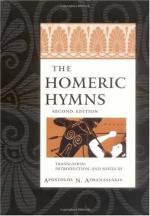If this view be admitted for the moment, and for the argument’s sake, we may ask how it applies to the myths of Apollo. Among the ideas which even now prevail among the backward peoples still in the neolithic stage of culture, we may select a few conceptions. There is the conception of a great primal anthropomorphic Being, who was in the beginning, or, at least, about whose beginning legend is silent. He made all things, he existed on earth (in some cases), teaching men the arts of life and rules of conduct, social and moral. In those instances he retired from earth, and now dwells on high, still concerned with the behaviour of the tribes.
This is a lofty conception, but it is entangled with a different set of legends. This primal Being is mixed up with strange persons of a race earlier than man, half human, half bestial. Many things, in some cases almost all things, are mythically regarded, not as created, but as the results of adventures and metamorphoses among the members of this original race. Now in New Zealand, Polynesia, Greece, and elsewhere, but not, to my knowledge, in the very most backward peoples, the place of this original race, “Old, old Ones,” is filled by great natural objects, Earth, Sky, Sea, Forests, regarded as beings of human parts and passions.
The present universe is mythically arranged in regard to their early adventures: the separation of sky and earth, and so forth. Where this belief prevails we find little or no trace of the primal maker and master, though we do find strange early metaphysics of curiously abstract quality (Maoris, Zunis, Polynesians). As far as our knowledge goes, Greek mythology springs partly from this stratum of barbaric as opposed to strictly savage thought. Ouranos and Gaea, Cronos, and the Titans represent the primal beings who have their counterpart in Maori and Wintu legend. But these, in the Greece of the Epics and Hesiod, have long been subordinated to Zeus and the Olympians, who are envisaged as triumphant gods of a younger generation. There is no Creator; but Zeus—how, we do not know—has come to be regarded as a Being relatively Supreme, and as, on occasion, the guardian of morality. Of course his conduct, in myth, is represented as a constant violation of the very rules of life which he expects mankind to observe. I am disposed to look on this essential contradiction as the result of a series of mythical accretions on an original conception of Zeus in his higher capacity. We can see how the accretions arose. Man never lived consistently on the level of his best original ideas: savages also have endless myths of Baiame or Daramulun, or Bunjil, in which these personages, though interested in human behaviour, are puerile, cruel, absurd, lustful, and so on. Man will sport thus with his noblest intuitions.
In the same way, in Christian Europe, we may contrast Dunbar’s pious “Ballat of Our Lady” with his “Kynd Kittok,” in which God has his eye on the soul of an intemperate ale-wife who has crept into Paradise. “God lukit, and saw her lattin in, and leugh His heart sair.” Examples of this kind of sportive irreverence are common enough; their root is in human nature: and they could not be absent in the mythology of savage or of ancient peoples. To Zeus the myths of this kind would come to be attached in several ways.




